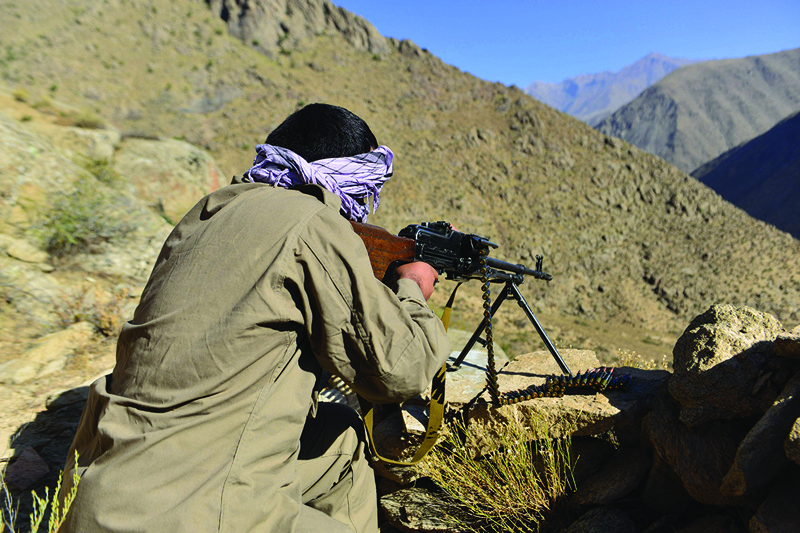 PANJSHIR: An Afghan resistance movement and anti-Taleban uprising forces personnel takes part in a military training at Malimah area of Dara district in Panjshir province as the valley remains the last major holdout of anti-Taleban forces. - AFP
PANJSHIR: An Afghan resistance movement and anti-Taleban uprising forces personnel takes part in a military training at Malimah area of Dara district in Panjshir province as the valley remains the last major holdout of anti-Taleban forces. - AFPKABUL: Taleban fighters have advanced deep into Afghanistan's holdout Panjshir Valley, with resistance fighters saying they are keeping the Islamists at bay, but analysts warned they are struggling. Italian aid agency Emergency, which runs a hospital in Panjshir, said Taleban forces had reached the village of Anabah, where they run a surgical centre. "Many people have fled from local villages in recent days," Emergency said in a statement, adding it was continuing to provide medical services.
"There has so far been no interference with Emergency's activities," it said. "We have received a small number of wounded people at the Anabah Surgical Centre." Anabah lies some 25 kilometers north inside the 115-km-long valley, but unconfirmed reports suggested the Taleban had seized other areas too. Bill Roggio, managing editor of the US-based Long War Journal, said Sunday that there was still a "fog of war" with unconfirmed reports the Taleban had captured multiple districts-but that "it looks bad".
Both sides claim to have inflicted heavy losses on each other. "The Taleban army has been hardened with 20 years of war, and make no mistake, the Taleban trained an army," Roggio tweeted Sunday, adding that "the odds were long" for the Panjshir resistance. "The Taleban army was injected with a massive amount of weapons and munitions after the US withdrawal and collapse of the ANA" (Afghan National Army), he added. Fighters in Panjshir held out for a decade against the Soviet military and also the Taleban's first regime from 1996-2001.
Ali Maisam Nazary-who is not in Panjshir but remains a spokesman for the resistance-boasted Sunday that the resistance "will never fail". But former vice-president Amrullah Saleh, who is holed out in Panjshir alongside Ahmad Massoud-the son of legendary anti-Taleban commander Ahmad Shah Massoud-warned of a grim situation. Saleh in a statement spoke of a "large-scale humanitarian crisis", with thousands "displaced by the Taleban onslaught".
Pro-Taleban social media have boasted of capturing swathes of the valley, but Nick Waters from the investigative website Bellingcat said the posts did not include verifiable photographs to back up the claims. "It will be quite easy to verify a video showing Taleban within the Panjshir valley," Waters said. The Panjshir Valley, surrounded by jagged snow-capped peaks, offers a natural defensive advantage, with fighters melting away in the face of advancing forces, then launching ambushes firing from the high tops down into the valley.
Civil war 'likely'
Afghanistan will "likely" erupt in civil war, the top US general told US media Saturday, warning that those conditions could see a resurgence of terrorist groups in the country. As American forces began their withdrawal, the Taleban took over Afghanistan in a lightning campaign, with only the northern province Panjshir holding out against the hardline Islamists. "My military estimate... is that the conditions are likely to develop of a civil war," General Mark Milley, chairman of the Joint Chiefs of Staff, told Fox News.
He questioned whether the Taleban-who are yet to declare a government-would be able to consolidate power and establish effective governance. "I think there's at least a very good probability of a broader civil war and that will then in turn lead to conditions that could, in fact, lead to a reconstitution of Al-Qaeda or a growth of ISIS or other... terrorist groups," Milley said. Emphasizing that he could not predict what would happen next in Afghanistan, he nonetheless gave a bleak assessment.
"The conditions are very likely," Milley told Fox News, "that you could see a resurgence of terrorism coming out of that general region within 12, 24, 36 months." The United States invaded Afghanistan and toppled the first Taleban regime in 2001 in the wake of the 9/11 attacks by Al-Qaeda, which had sanctuary in the country. Western governments fear Afghanistan could again become a haven for extremists bent on attacking them. The United States has said it will maintain an "over-the-horizon" capability to strike against any threats to its security in Afghanistan. - Agencies









